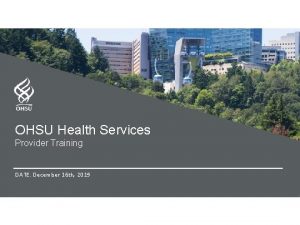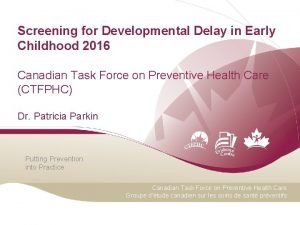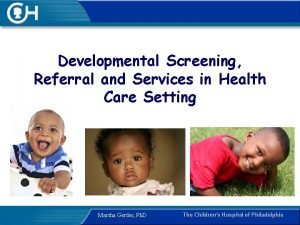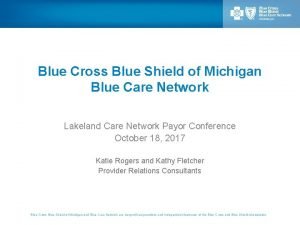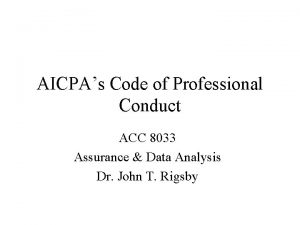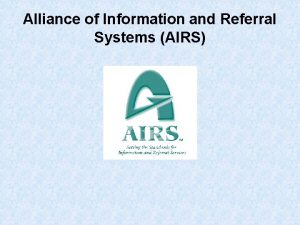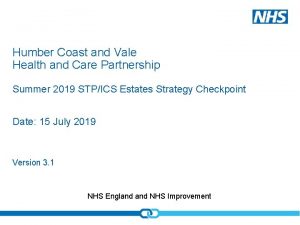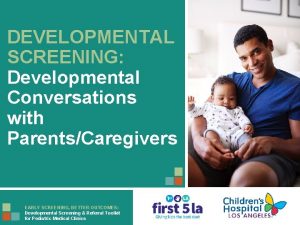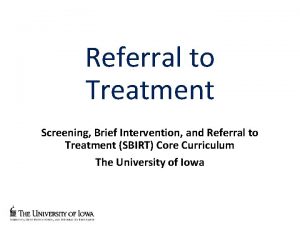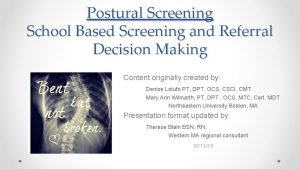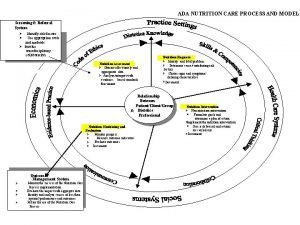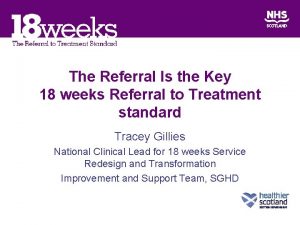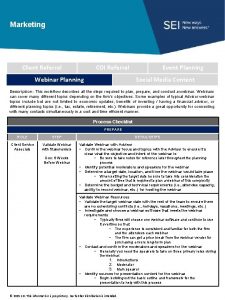Developmental Screening Referral and Services in Health Care


































- Slides: 34

Developmental Screening, Referral and Services in Health Care Setting Marsha Gerdes, Ph. D The Children's Hospital of Philadelphia

SERIES: A Paradigm for Thinking about Screening Early Identification Referral I ntake Eligibility Services

Topics for today 1. How young children develop and learn and developmental problems in early childhood 2. What is developmental screening and developmental screening tools 3. Next steps after you get the screening results Marsha Gerdes, Ph. D The Children's Hospital of Philadelphia

How children learn Naturally By watching By doing Step-by-step Marsha Gerdes, Ph. D The Children's Hospital of Philadelphia

Language development Sentences Cooing 6 months First words 1 year Tells stories Two word phrase 2 year Marsha Gerdes, Ph. D 3 years 4 -5 years The Children's Hospital of Philadelphia

Cognitive development Counts Holds and bangs rattle 6 months Puts things in container 1 year Make believe play 2 year Marsha Gerdes, Ph. D Knows colors 3 years 4 -5 years The Children's Hospital of Philadelphia

Fine motor development Draws lines Draws circles Writes name Scribbles Passes toy from hand to hand 6 months 1 year 2 year Marsha Gerdes, Ph. D 3 years 4 -5 years The Children's Hospital of Philadelphia

Gross motor development Jumps Walks Sits 6 months Climbs well Walks up stairs (9 -15 mos) 1 year 2 years Marsha Gerdes, Ph. D 3 years 4 -5 years The Children's Hospital of Philadelphia

Social development Smiles at people 6 months Plays games (peek-aboo) 1 year Plays beside peers 2 year Marsha Gerdes, Ph. D Has good friend 3 years Follows simple rules of a game 4 -5 years The Children's Hospital of Philadelphia

What is a developmental delay? • Child learns new skills at a slower rate in one or more domain • Some children with delays have medical or genetic disorders. Marsha Gerdes, Ph. D The Children's Hospital of Philadelphia

Risk factors for developmental delay • Prematurity • Genetic disorders - Down Syndrome, 22 q 11. 2 • Medical conditions – Cerebral infarct and other condition • Exposure to life stresses • Undetermined Marsha Gerdes, Ph. D The Children's Hospital of Philadelphia

Developmental Disabilities are common! n. How common? n 1 in 6 children in the US had a DD from 2006 -2008 n= 15% of children age 3 -17 yo n= 10 million children n. Pediatrics 2011; 127: 10341042 The Children's Hospital of Philadelphia

Help for young children with delays • Early Intervention • Preschools • Therapies • Activities at home Marsha Gerdes, Ph. D The Children's Hospital of Philadelphia

What is Early Intervention? • Education and therapy for children birth to 5 years • Speech therapy, physical therapy, teachers, occupational therapy • Available in every state • Free in Pennsylvania for everyone Marsha Gerdes, Ph. D The Children's Hospital of Philadelphia

Early Intervention is a legal right • Federal Law: Individuals with Disabilities Education Act (IDEA) 2004 Marsha Gerdes, Ph. D The Children's Hospital of Philadelphia

Pennsylvania Early Intervention program • Children birth through 36 months -Services provided by Child. Link in Philadelphia -Usually at home • Children 3 years to 5 years -Services provided by Elwyn in Philadelphia and IUs in counties -Usually at preschools Marsha Gerdes, Ph. D The Children's Hospital of Philadelphia

Does Early Intervention help ? Yes! Children with EI are more likely to… • Do better in school • Keep up with schoolwork • Graduate high school • Become successful adults Marsha Gerdes, Ph. D The Children's Hospital of Philadelphia

Developmental Screening The way we find children who have delays and get them the help that they deserve Marsha Gerdes, Ph. D The Children's Hospital of Philadelphia

AAP Policy Statement, 2006 n. Developmental surveillance at every well-child visit n. Recognize children who may be at risk of developmental delays n. Standardized developmental screening tests at 9, 18 and 30 month visits n. Specific screen for ASD at 18 & 24 month visits Pediatrics, Vol 118, July 2006, 405 -420. Marsha Gerdes, Ph. D The Children's Hospital of Philadelphia

Developmental Screening Policy Pennsylvania Medicaid/EPSDT requires that standardized tools be used at the 9, 18, 24, and 30 month well visits for complete reimbursement. Both Private insurance and Medicaid reimburses for use of a standardized tool. Marsha Gerdes, Ph. D The Children's Hospital of Philadelphia

Developmental Screening • Informal -Parents notice -Doctors notice • Formal -Asking parents questions about their child -Screening can occur in pediatric offices, childcare centers, and case workers Marsha Gerdes, Ph. D The Children's Hospital of Philadelphia

Why formal screening is important? • Pediatricians miss 25% of children with developmental delays • Parents often unaware that child is delayed Marsha Gerdes, Ph. D The Children's Hospital of Philadelphia

What Works: Validated Instruments 1. Professionally-administered screening tests 2. Parental concerns/questionnaires Marsha Gerdes, Ph. D The Children's Hospital of Philadelphia

Standards for Screening Tests n. Standardized on national sample n. Proof of reliability n. Evidence of validity n. Accuracy, i. e. : Sensitivity 70 -80%, Specificity 70 -80% Marsha Gerdes, Ph. D The Children's Hospital of Philadelphia

Validated Instruments For development: Ages and Stages Questionnaire-3 (ASQ-III) Parents’ evaluation of developmental status (PEDS) Survey of Well-Being of Young Children (SWYC) For Autism: Modified Checklist for Autism in Toddlers, Revised (MCHAT-R/F) Marsha Gerdes, Ph. D The Children's Hospital of Philadelphia

Ages and Stages Questionnaire • 30 questions parents can answer • Easy to use and score • Available in Spanish • Provides scores in 5 domains ( communication, fine motor, personal-social, problem solving and gross motor) Marsha Gerdes, Ph. D The Children's Hospital of Philadelphia

PEDS • 10 questions parents can answer • Parent state concerns and then write in what the concern is • Algorithium provided for scoring • Available in Spanish and many other languages Marsha Gerdes, Ph. D The Children's Hospital of Philadelphia

Survey of Well-being of Young Children (SWYC) • 10 questions parents can answer • Easy to use • Available in Spanish Nepali Burmese Marsha Gerdes, Ph. D The Children's Hospital of Philadelphia

A few SWYC questions • How much does your child… -Pull up to standing? -Pick up food and eat it? -Run? -Name a color? -Draw shapes? Marsha Gerdes, Ph. D The Children's Hospital of Philadelphia

Modified Checklist for Autism in Toddlers (M-CHAT R/F) 23 questions with follow up questions for failed items Just about autism Easy to use False positives can be reduced by using the follow up questions Marsha Gerdes, Ph. D The Children's Hospital of Philadelphia

M-CHAT Please fill out the following about how your child usually is. Please try to answer every question. If the behavior is rare (e. g. , you've seen it once or twice), please answer as if the child does not do it. 1. Does your child enjoy being swung, bounced on your knee, etc. ? Yes No 2. Does your child take an interest in other children? Yes No 3. Does your child like climbing on things, such as up stairs? Yes No 4. Does your child enjoy playing peek-a-boo/hide-and-seek? Yes No pretend other things? Yes No 6. Does your child ever use his/her index finger to point, to ask for something? Yes No 7. Does your child ever use his/her index finger to point, to indicate interest in something? Yes No 5. Does your child ever pretend, for example, to talk on the phone or take care of dolls, or 8. Can your child play properly with small toys (e. g. cars or bricks) without just mouthing, fiddling, or dropping them? Yes No 9. Does your child ever bring objects over to you (parent) to show you something? Yes No 10. Does your child look you in the eye for more than a second or two? Yes No 11 -23 not listed here. • © 1999 Diana Robins, Deborah Fein, & Marsha Gerdes, Ph. D The Children's Hospital of Philadelphia

Developmental Screening at Well Child Visit • Provide questionnaire to family -Prior to visit -In waiting room • Score and Review results • Have a conversation with the family -Understand their concerns Marsha Gerdes, Ph. D The Children's Hospital of Philadelphia

Developmental Screening at Well Child Visit • Refer to EI with strong explanation of services • Refer to other supports • Offer family a few activities to do at home Marsha Gerdes, Ph. D The Children's Hospital of Philadelphia

Thank You! Marsha Gerdes, Ph. D The Children's Hospital of Philadelphia
 Types of referrals
Types of referrals Ohsu health ids
Ohsu health ids Denver developmental screening test
Denver developmental screening test Developmental screening vs surveillance
Developmental screening vs surveillance Trivandrum developmental screening chart
Trivandrum developmental screening chart Trivandrum developmental screening test
Trivandrum developmental screening test Pddst-ii
Pddst-ii Iap slides
Iap slides Health and social component 3
Health and social component 3 Ereferrals.bcbsm.com
Ereferrals.bcbsm.com Mash referral form
Mash referral form Health and social care values unit 2
Health and social care values unit 2 Objectives of school health programme
Objectives of school health programme Horizon nj health careers
Horizon nj health careers Theta program in community dentistry
Theta program in community dentistry Health care levels primary secondary tertiary
Health care levels primary secondary tertiary Care provider background screening clearinghouse
Care provider background screening clearinghouse Illinois health care services lien act
Illinois health care services lien act Definition of primary health care services
Definition of primary health care services Primary health care principles
Primary health care principles Incidental medical services definition
Incidental medical services definition Mobile occupational health screening unit
Mobile occupational health screening unit Nrl head injury recognition and referral form
Nrl head injury recognition and referral form What is immediate family considered
What is immediate family considered Who needs a caf number
Who needs a caf number Suspected cancer recognition and referral
Suspected cancer recognition and referral Suspected cancer recognition and referral
Suspected cancer recognition and referral Airs certification
Airs certification West yorkshire health and care partnership
West yorkshire health and care partnership Humber, coast and vale health and care partnership
Humber, coast and vale health and care partnership Example of appraisal in health and social care
Example of appraisal in health and social care Sam and verna
Sam and verna Chapter 50 intellectual and developmental disabilities
Chapter 50 intellectual and developmental disabilities Motivational and affective factors 3 principles
Motivational and affective factors 3 principles Selection criteria for international assignments
Selection criteria for international assignments

